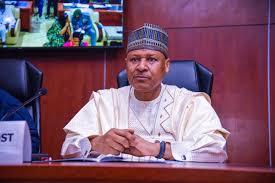
Daniel Otera
Nigeria’s Information Minister, Mohammed Idris, has accused some United States lawmakers of relying on “inaccurate and misleading data” to allege a Christian genocide in the country, renewing a bitter diplomatic and domestic debate over the scale and nature of violence in Nigeria.
Idris made the contention during an interview on CNN, a development confirmed in a statement released by his media aide, Rabiu Ibrahim4. The minister argued that portraying the country’s security crisis as sectarian risks oversimplifying a complex mix of banditry, communal conflict and insurgency.
“Some of the claims made by officials of the United States are based on faulty data and the assumption that victims of violence are largely Christians,” he said.
The Presidency and the Information Ministry have repeatedly rejected the accusation that the state tolerates or perpetrates a campaign of violence against Christians. The government says its security strategy is religiously neutral and that media or political narratives that frame attacks as targeting one faith run the risk of deepening division and aiding criminals who seek to foment religious tension.
“The criminals want to portray the situation as a fight between Christians and Muslims. It is wrong to describe Nigeria as a country that does not tolerate religious freedom,” the minister insisted, warning that such characterisations “will drive Nigeria towards unnecessary division”.
The Presidency has previously accused some US actors of a deliberate disinformation campaign, alleging an organised effort to pressure international actors against Nigeria based on selective or misleading evidence.
A group of US legislators asked the Secretary of State to consider strong diplomatic measures against Nigeria, claiming there is “systematic persecution and slaughter of Christians.” Among the most cited figures is an assertion by at least one US lawmaker that roughly 7,000 Christians were killed in Nigeria this year, an estimate that has been amplified across online and broadcast channels and has driven calls for US designation and action.
Those figures have not been accepted by the Federal Government and have been disputed on grounds ranging from data provenance to methodology. Critics of the numbers point out that casualty tallies in conflict zones are notoriously difficult to verify and often depend on the narrow data sources favoured by particular advocacy groups.
The Christian Association of Nigeria (CAN) has publicly backed concerns about attacks on Christian communities, particularly in parts of northern Nigeria, and has called for protective and diplomatic action for affected communities. CAN’s position complicates the government’s effort to dismiss the allegation as purely manufactured and shows a clear domestic constituency insisting the violence has a sectarian dimension.
Human-rights monitors and independent conflict analysts note that while some attacks are explicitly sectarian, many violent incidents in Nigeria stem from criminal banditry, communal land disputes, herder–farmer clashes and insurgency in the northeast. Those analysts caution against simple binary labels and urge careful, source‑by‑source verification before drawing international legal or diplomatic conclusions.
Disagreement over basic figures exposes deeper problems with how casualty data is gathered and presented. Government counts often rely on official security reports and confirmations by state actors. Religious bodies and civil-society groups typically collate reports from local communities and networks. International media and activist groups may combine both sets of records, sometimes using extrapolation to arrive at nationwide estimates.
The Information Minister’s critique focuses on that methodological divide: when analysts or politicians present aggregated numbers without transparent sourcing or peer-reviewed methods, the resulting claims can be labelled “faulty” by sceptics and “vital” by advocacy groups pressing for immediate protection measures.
The row has immediate diplomatic implications. Requests by US lawmakers urging the Secretary of State to take action, if acted upon, could trigger sanctions or affect bilateral cooperation on security and development. The Presidency’s rejection and allegations of a targeted misinformation campaign suggest Abuja may pursue diplomatic rebuttals, data‑sharing exercises, or public inquiries to contest external claims.
Domestically, the debate sharpens political fault lines. CAN’s confirmation that communities have suffered severe assaults lends weight to demands for improved protection for vulnerable populations, while the government’s counter‑narrative frames such demands as politically or externally motivated if they rest on contested figures.
The disagreement between the Federal Government and some US lawmakers is simultaneously technical and deeply political. At its heart lies an urgent and unambiguous reality: Nigerians across faiths are suffering violence and insecurity.
The policy challenge facing Abuja and international partners is to move past headline figures and build a transparent, independently verifiable picture of who is harmed, where and how so that protection, accountability and reconciliation measures can be properly targeted.
